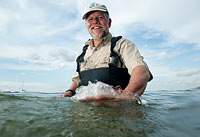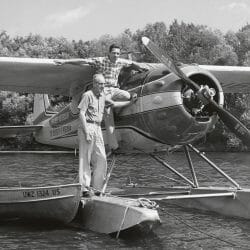Fair Share
With no shortage of research looking for grant money, good science can start to back up waiting for a turn.

A federal stimulus grant means Stephen Carpenter, a zoology professor and director of the Center for Limnology, will get to spend more time doing research in Lake Mendota. Photo: Jeff Miller
That changed a bit for UW-Madison this year with the infusion of funding from the American Recovery and Reinvestment Act, the federal government’s economic stimulus package.
“What the stimulus package did is clear the queue,” says zoology professor Stephen Carpenter. “It’s like you were at the grocery store in a long line to check out, and then they opened half a dozen more checkout stations.”
By mid-September, the university had drawn more than $47 million in funding for nearly 160 projects and programs spread across academic disciplines.
Veterinary epidemiologist Dörte Döpfer, bacteriology professor Charles Kaspar, and a computer modeler at Texas A&M University together landed a $1 million grant from the National Science Foundation (NSF) to study E. coli’s adaptations inside and outside hosts such as cattle.
“The reviewers recognized that we were young investigators,” Döpfer says. “They liked the idea of interdisciplinary study. They were also interested in the equipment included, that we’re stimulating the economy in that regard as well.”
And it didn’t hurt that their project created five laboratory jobs.
“It’s actually pretty inefficient to have half the country’s scientists looking for resources instead of doing science,” says Carpenter, whose own NSF stimulus grant will allow him to study the nutrient inputs in lake food webs.
The two-year term of most stimulus grants will have many back in line for funding soon, but Carpenter isn’t complaining.
“I’m delighted. I have no idea what the economic impact will be, but it’s making a lot of good things happen, and it makes room for many more good ideas,” he says. “It would be a great time to send in a good idea.”
Published in the Winter 2009 issue



Comments
No comments posted yet.